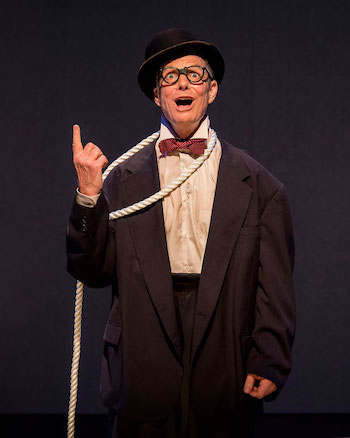Theater Interview: Performer Bill Irwin – Channeling Samuel Beckett
By Robert Israel
“Samuel Beckett’s work speaks to me because he’s a very visceral writer. And, because I have training as a clown, I think of him as a natural clown.”
72-year-old stage/screen actor, vaudevillian, clown, and mime Bill Irwin returns to Boston on October 26 through 30 (at Arts Emerson’s Paramount Center) via On Beckett, a one-man show dedicated to the work of Samuel Beckett (1906-1989). The 90-minute production, which he conceived and performed originally at the Irish Repertory Theatre in New York in 2018 (it earned him the Lucille Lortel Award for Outstanding Alternative Theatrical Experience in 2019), draws freely from the prolific theatrical and prose canon of the Nobel laureate. He is no stranger to the writer’s poetically slapstick; he performed the role of Lucky in Waiting for Godot, (a production directed by Mike Nichols that featured Robin Williams, Lukas Haas, Steve Martin, and F. Murray Abraham, at Lincoln Center’s Newhouse Theater in New York, in 1988).
Arts Fuse caught up with Irwin in San Francisco for a brief telephone interview during a break in rehearsal at the American Conservatory Theater. He has been traveling in what he calls a “barnstorming tour” of the show nationally.

Bill Irwin in the Irish Repertory Theatre production of On Beckett. Photo: Craig Schwartz.
Arts Fuse: You’ve been living and performing Samuel Beckett’s works for several decades now. What specifically about his work has gotten into your craw?
Bill Irwin: After all this time performing his work, I wish I could say several pithy things about him and his work, but all I can say is that Beckett’s work speaks to me because he’s a very visceral writer. And, because I have training as a clown, I think of him as a natural clown, he grew up a clown, and he had a thing for clowns. He was fascinated with Laurel and Hardy. He wrote a film starring pantomime Buster Keaton. And I share an affinity with his Irish roots. Many years ago I went to school in Belfast, in Northern Ireland, so I draw on that experience as a young man living in Ireland when I read and perform him.
AF: It has been documented that Beckett had a great disdain for Ireland.
Irwin: Yes, that’s true, he did. He left Ireland and he went to live in Paris in the midst of all that literary and artistic ferment that was going on there before and after World War II. He left Ireland because he was hurt and pissed off, he was furious with his family, and he was full of mad rebellion. He had a very difficult relationship with Ireland and with his family. And a lot of that comes across in his plays. But not in all his works.
AF: In what specific works of his do you find a different side to him?
Irwin: I’ll probably go to my grave having not read all of his novels, but to me, a different side of him comes across in his letters and in his postcards. He was not the first born son in his family, but he writes home with the tone of a dutiful son, and in many of his letters he’s not only gracious but kind and loving.
AF: Playwright Harold Pinter once noted that Beckett was extremely gracious.
Irwin: Yes, that’s true. Pinter met Beckett in Paris and they went out for a night of heavy drinking and acting like party animals, and Pinter collapsed from too much drink. They were in an all-night café. Pinter remembered that Beckett disappeared and came back to minister to him a glass of bicarbonate of soda, nursing him back to consciousness. And then they proceeded to carry on the rest of the night drinking and talking. They had a terse and efficient correspondence, and Beckett’s graciousness came across there, too, in his critiques of Pinter’s plays. But Beckett was not as austere as he comes across in his works.
AF: You mentioned Beckett’s penchant for being visceral. Do you ever find yourself over-thinking your interpretation of his works when performing this show?
Bill Irwin: After many years performing him, there are times I take stock in it and wonder if I need to figure it out again, to make it better, to move the text around a bit. But the impetus of the show, for me, is the joy of sharing it with audiences, so I return to that. I don’t mention this in the show, but I got to meet Sam Beckett many years ago in New York. I was so overwhelmed meeting him that I don’t remember saying much to him, but I do remember that he was very gracious. And the late New York Times reporter Mel Gussow told me he mentioned me to Beckett, and that Beckett complimented my work. So, I will bring those memories of having briefly met him when I perform his work in Boston.
Robert Israel can be reached at risrael_97@yahoo.com.
